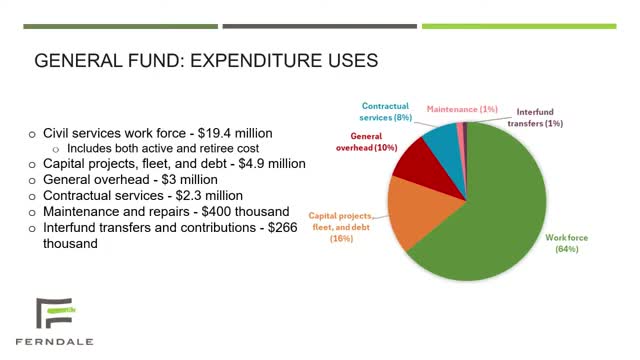Officials warn Ferndale budget faces growing wage, benefits and contract pressures despite retiree-health savings
Get AI-powered insights, summaries, and transcripts
Subscribe
Summary
Presenters said personnel costs — roughly two-thirds of spending — and upcoming union contract renewals will drive budget pressure even though retiree health changes and insurance payment schedule changes reduced near-term costs.
Ferndale staff told the council the proposed general fund for FY2026 is balanced in the draft but faces continued pressure from wages, fringe benefits and five upcoming union contract renewals that together could require near-term amendments.
Staff emphasized that personnel costs form the majority of general-fund spending: roughly 64% of expenditures were presented as personnel-related, and about 72% of labor costs were attributed to public safety (police and fire). Presenters said the city’s perennial challenge is that many fixed costs — retiree health, pensions and other fringe obligations — do not sit comfortably with short-term revenue constraints.
Savings and offsets cited in the workshop: - Retiree health: the city has shifted many retiree health benefits to a Medicare Advantage plan and tightened payment schedules for active coverage; HR and finance staff said those changes reduced historical expendable liabilities, producing a multi-hundred-thousand-dollar improvement in 2025 and an expected several-hundred-thousand-dollar benefit for FY2026. - Health-insurance payment timing: staff moved the city from a periodic overpayment schedule to a closer-to-actual weekly payment cadence with the insurer; finance staff said the city is operating with a large credit balance in that self-funded plan as of the presentation.
Cost pressures and uncertainties: - Five bargaining units will negotiate contracts that staff said could materially affect FY2026 projections; roughly 80% of the city’s workforce belongs to unions and the timing of settlements could necessitate early budget amendments after adoption. - Wages in many job categories lag regional comparators, staff said, and typical annual projection assumptions are not likely to cover full increases demanded in labor negotiations.
Process notes: finance staff Phil described built-in contingencies in the draft and emphasized that the council will see amendments if negotiations or unexpected economic trends require them. Councilmembers asked for more detail on fringe-rate calculations and the departmental presentation of retiree health costs; staff clarified that retiree health currently is budgeted as a line within individual department budgets rather than as a single centralized fringe account.
Speakers: finance staff Phil and City Manager Colleen led the explanation of personnel cost drivers; several council members queried specifics about contract timing and fringe-rate calculation.
Ending: staff asked council to prioritize what services to preserve or alter if bargaining and external cost pressures force tradeoffs during the budget adoption process.
